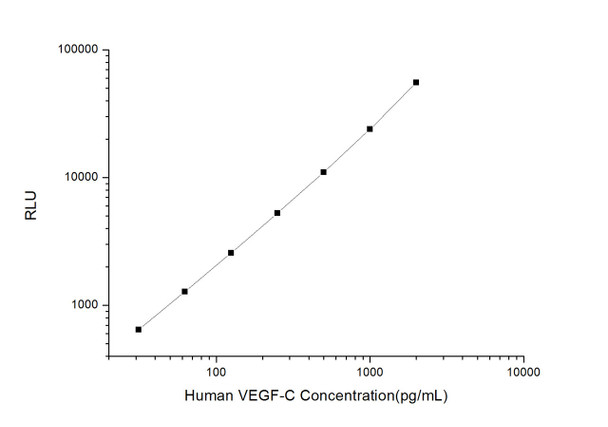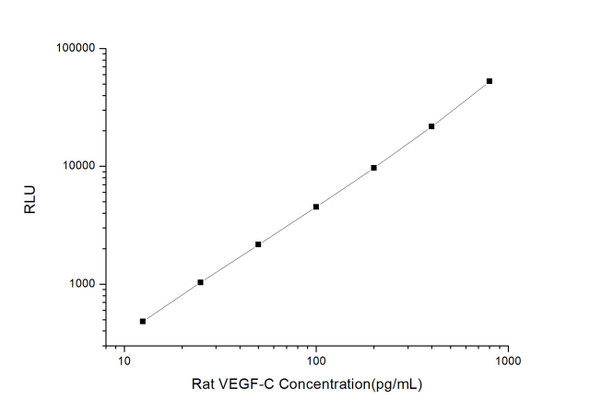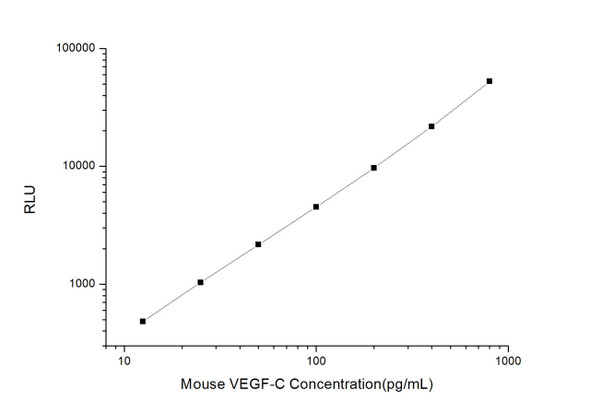Human Cardiovascular ELISA Kits
Human VEGF-C (Vascular Endothelial Growth Factor C) CLIA Kit (HUES00911)
- SKU:
- HUES00911
- Product Type:
- ELISA Kit
- ELISA Type:
- CLIA Kit
- Size:
- 96 Assays
- Sensitivity:
- 18.75pg/mL
- Range:
- 31.25-2000pg/mL
- ELISA Type:
- Sandwich
- Synonyms:
- VEGFC, Flt4-L, VRP
- Reactivity:
- Human
- Sample Type:
- Serum, plasma and other biological fluids
- Research Area:
- Cardiovascular
Description
| Assay type: | Sandwich |
| Format: | 96T |
| Assay time: | 4.5h |
| Reactivity: | Human |
| Detection method: | Chemiluminescence |
| Detection range: | 31.25-2000 pg/mL |
| Sensitivity: | 18.75 pg/mL |
| Sample volume: | 100µL |
| Sample type: | Serum, plasma and other biological fluids |
| Repeatability: | CV < 15% |
| Specificity: | This kit recognizes Human VEGF-C in samples. No significant cross-reactivity or interference between Human VEGF-C and analogues was observed. |
This kit uses Sandwich-CLIA as the method. The micro CLIA plate provided in this kit has been pre-coated with an antibody specific to Human VEGF-C. Standards or samples are added to the appropriate micro CLIA plate wells and combined with the specific antibody. Then a biotinylated detection antibody specific for Human VEGF-C and Avidin-Horseradish Peroxidase (HRP) conjugate are added to each micro plate well successively and incubated. Free components are washed away. The substrate solution is added to each well. Only those wells that contain Human VEGF-C, biotinylated detection antibody and Avidin-HRP conjugate will appear fluorescence. The Relative light unit (RLU) value is measured spectrophotometrically by the Chemiluminescence immunoassay analyzer. The RLU value is positively associated with the concentration of Human VEGF-C. The concentration of Human VEGF-C in the samples can be calculated by comparing the RLU of the samples to the standard curve.
| UniProt Protein Function: | VEGFC: Growth factor active in angiogenesis, and endothelial cell growth, stimulating their proliferation and migration and also has effects on the permeability of blood vessels. May function in angiogenesis of the venous and lymphatic vascular systems during embryogenesis, and also in the maintenance of differentiated lymphatic endothelium in adults. Binds and activates VEGFR-2 (KDR/FLK1) and VEGFR-3 (FLT4) receptors. Homodimer; non-covalent and antiparallel. Spleen, lymph node, thymus, appendix, bone marrow, heart, placenta, ovary, skeletal muscle, prostate, testis, colon and small intestine and fetal liver, lung and kidney, but not in peripheral blood lymphocyte. Belongs to the PDGF/VEGF growth factor family. |
| UniProt Protein Details: | Protein type:Cell cycle regulation; Motility/polarity/chemotaxis; Secreted, signal peptide; Secreted; Cytokine Chromosomal Location of Human Ortholog: 4q34. 3 Cellular Component: extracellular space; membrane; extracellular region Molecular Function:protein binding; growth factor activity; vascular endothelial growth factor receptor 3 binding; chemoattractant activity Biological Process: signal transduction; induction of positive chemotaxis; negative regulation of cell proliferation; morphogenesis of embryonic epithelium; platelet degranulation; positive chemotaxis; regulation of vascular endothelial growth factor receptor signaling pathway; positive regulation of cell proliferation; negative regulation of blood pressure; angiogenesis; positive regulation of cell-matrix adhesion; response to drug; substrate-bound cell migration; positive regulation of neuroblast proliferation; platelet activation; positive regulation of blood vessel endothelial cell migration; positive regulation of protein amino acid autophosphorylation; positive regulation of peptidyl-tyrosine phosphorylation; organ morphogenesis; positive regulation of angiogenesis; positive regulation of protein secretion; positive regulation of cell division; blood coagulation; vascular endothelial growth factor receptor signaling pathway; positive regulation of epithelial cell proliferation Disease: Lymphedema, Hereditary, Id |
| NCBI Summary: | The protein encoded by this gene is a member of the platelet-derived growth factor/vascular endothelial growth factor (PDGF/VEGF) family. The encoded protein promotes angiogenesis and endothelial cell growth, and can also affect the permeability of blood vessels. The proprotein is further cleaved into a fully processed form that can bind and activate VEGFR-2 and VEGFR-3 receptors. [provided by RefSeq, Apr 2014] |
| UniProt Code: | P49767 |
| NCBI GenInfo Identifier: | 1718154 |
| NCBI Gene ID: | 7424 |
| NCBI Accession: | P49767. 1 |
| UniProt Secondary Accession: | P49767,B2R9Q8, |
| UniProt Related Accession: | P49767 |
| Molecular Weight: | 46,883 Da |
| NCBI Full Name: | Vascular endothelial growth factor C |
| NCBI Synonym Full Names: | vascular endothelial growth factor C |
| NCBI Official Symbol: | VEGFC |
| NCBI Official Synonym Symbols: | VRP; Flt4-L; LMPH1D |
| NCBI Protein Information: | vascular endothelial growth factor C; FLT4 ligand DHM; vascular endothelial growth factor-related protein |
| UniProt Protein Name: | Vascular endothelial growth factor C |
| UniProt Synonym Protein Names: | Flt4 ligand; Flt4-L; Vascular endothelial growth factor-related protein; VRP |
| Protein Family: | Vascular endothelial growth factor |
| UniProt Gene Name: | VEGFC |
| UniProt Entry Name: | VEGFC_HUMAN |
As the RLU values of the standard curve may vary according to the conditions of the actual assay performance (e. g. operator, pipetting technique, washing technique or temperature effects), the operator should establish a standard curve for each test. Typical standard curve and data is provided below for reference only.
| Concentration (pg/mL) | RLU | Average | Corrected |
| 2000 | 55484 55958 | 55721 | 55693 |
| 1000 | 22169 25779 | 23974 | 23946 |
| 500 | 11687 10377 | 11032 | 11004 |
| 250 | 5121 5467 | 5294 | 5266 |
| 125 | 2753 2463 | 2608 | 2580 |
| 62.5 | 1368 1254 | 1311 | 1283 |
| 31.25 | 674 674 | 674 | 646 |
| 0 | 27 29 | 28 | -- |
Precision
Intra-assay Precision (Precision within an assay): 3 samples with low, mid range and high level Human VEGF-C were tested 20 times on one plate, respectively.
Inter-assay Precision (Precision between assays): 3 samples with low, mid range and high level Human VEGF-C were tested on 3 different plates, 20 replicates in each plate.
| Intra-assay Precision | Inter-assay Precision | |||||
| Sample | 1 | 2 | 3 | 1 | 2 | 3 |
| n | 20 | 20 | 20 | 20 | 20 | 20 |
| Mean (pg/mL) | 102.39 | 308.54 | 852.34 | 97.94 | 306.40 | 886.10 |
| Standard deviation | 11.89 | 35.30 | 57.79 | 9.19 | 24.05 | 100.40 |
| C V (%) | 11.61 | 11.44 | 6.78 | 9.38 | 7.85 | 11.33 |
Recovery
The recovery of Human VEGF-C spiked at three different levels in samples throughout the range of the assay was evaluated in various matrices.
| Sample Type | Range (%) | Average Recovery (%) |
| Serum (n=5) | 99-110 | 105 |
| EDTA plasma (n=5) | 97-112 | 103 |
| Cell culture media (n=5) | 90-103 | 95 |
Linearity
Samples were spiked with high concentrations of Human VEGF-C and diluted with Reference Standard & Sample Diluent to produce samples with values within the range of the assay.
| Serum (n=5) | EDTA plasma (n=5) | Cell culture media (n=5) | ||
| 1:2 | Range (%) | 85-99 | 92-105 | 101-115 |
| Average (%) | 91 | 99 | 107 | |
| 1:4 | Range (%) | 98-114 | 92-108 | 84-97 |
| Average (%) | 104 | 100 | 90 | |
| 1:8 | Range (%) | 101-120 | 101-113 | 96-109 |
| Average (%) | 110 | 107 | 101 | |
| 1:16 | Range (%) | 94-108 | 93-108 | 94-109 |
| Average (%) | 101 | 99 | 100 |
An unopened kit can be stored at 4°C for 1 month. If the kit is not used within 1 month, store the items separately according to the following conditions once the kit is received.
| Item | Specifications | Storage |
| Micro CLIA Plate(Dismountable) | 8 wells ×12 strips | -20°C, 6 months |
| Reference Standard | 2 vials | |
| Concentrated Biotinylated Detection Ab (100×) | 1 vial, 120 µL | |
| Concentrated HRP Conjugate (100×) | 1 vial, 120 µL | -20°C(shading light), 6 months |
| Reference Standard & Sample Diluent | 1 vial, 20 mL | 4°C, 6 months |
| Biotinylated Detection Ab Diluent | 1 vial, 14 mL | |
| HRP Conjugate Diluent | 1 vial, 14 mL | |
| Concentrated Wash Buffer (25×) | 1 vial, 30 mL | |
| Substrate Reagent A | 1 vial, 5 mL | 4°C (shading light) |
| Substrate Reagent B | 1 vial, 5 mL | 4°C (shading light) |
| Plate Sealer | 5 pieces | |
| Product Description | 1 copy | |
| Certificate of Analysis | 1 copy |
- Set standard, test sample and control (zero) wells on the pre-coated plate and record theirpositions. It is recommended to measure each standard and sample in duplicate. Note: addall solutions to the bottom of the plate wells while avoiding contact with the well walls. Ensuresolutions do not foam when adding to the wells.
- Aliquot 100 µL of standard solutions into the standard wells.
- Add 100 µL of Sample / Standard dilution buffer into the control (zero) well.
- Add 100 µL of properly diluted sample (serum, plasma, tissue homogenates and otherbiological fluids. ) into test sample wells.
- Cover the plate with the sealer provided in the kit and incubate for 90 min at 37 °C.
- Aspirate the liquid from each well, do not wash. Immediately add 100 µL of BiotinylatedDetection Ab working solution to each well. Cover the plate with a plate seal and gently mix. Incubate for 1 hour at 37 °C.
- Aspirate or decant the solution from the plate and add 350 µL of wash buffer to each welland incubate for 1-2 minutes at room temperature. Aspirate the solution from each well andclap the plate on absorbent filter paper to dry. Repeat this process 3 times. Note: a microplatewasher can be used in this step and other wash steps.
- Add 100 µL of HRP Conjugate working solution to each well. Cover with a plate seal andincubate for 30 min at 37 °C.
- Aspirate or decant the solution from each well. Repeat the wash process for five times asconducted in step 7.
- Add 100 µL of Substrate mixture solution to each well. Cover with a new plate seal andincubate for no more than 5 min at 37 °C. Protect the plate from light.
- Determine the RLU value of each well immediately.






